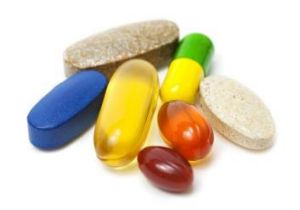Off-the-shelf supplements and herbal remedies are popular with the general population. But what do the medical experts think?
-
Paula Goodyer
 Mental health: No solution in a bottle – yet. Photo: SuppliedThe idea of an over-the-counter pill to improve mental wellbeing has appeal. One in five of us will have a problem with mental health at some time, especially anxiety or depression. But can supplements or herbal remedies make a difference?
Mental health: No solution in a bottle – yet. Photo: SuppliedThe idea of an over-the-counter pill to improve mental wellbeing has appeal. One in five of us will have a problem with mental health at some time, especially anxiety or depression. But can supplements or herbal remedies make a difference?
“We’re seeing an increase in the use of complementary medicines for mental health conditions, but while some have evidence that they work to some degree, others have very little data to support their use or none at all,” says Dr Jerome Sarris, senior research fellow from the University of Melbourne’s Department of Psychiatry. “People need to know which products have proof to back up their claims and be aware of potential interactions with prescription drugs.”
Price is another issue. Some products like omega-3 fats might not break the budget, but S-adenosyl-methionine (SAMe), a supplement promoted as helping depression, can cost as much as $70 a week.
Dr Sarris has shed light on the evidence for complementary medicine and mental health with a report in Australian Prescriber, an independent review of drugs and therapeutics published by the National Prescribing Service.
Let’s start with herbs for anxiety. Research suggests a benefit from traditional remedies like ginkgo, passionflower, chamomile, skullcap, lemon balm and bacopa, but it’s still very limited, he says. St John’s wort gets a tick for improving depression but is not recommended for anxiety. There is evidence for an anti-anxiety benefit from kava, but the downside is concerns about liver toxicity that has seen it withdrawn from the UK and Europe. While kava products are allowed in Australia at certain doses, they should be used with medical guidance, Dr Sarris says.
Besides St John’s wort, supplements and herbs with the most evidence to aid depression are omega 3 fatty acids, zinc and two supplements: S-adenosyl-methionine (SAMe or ”sammy”), a chemical made in the body and thought to enhance production of mood-enhancing brain chemicals, and N-acetyl cysteine – an amino acid with antioxidant properties that may help improve depression for people with bipolar disorder.
But despite omega-3 fats’ anti-depressant reputation, it’s not clear what formulation is best or at what dose. If you are shopping for an omega-3 supplement to improve mood, it helps to know which fatty acid may be most useful. While the brain needs both EPA (eicosapentanoic acid) and DHA (docosahexaenoic acid), supplements containing EPA or mainly EPA seem to have the most anti-depressant effect, says Sarris.
Most likely only a minority of psychiatrists would recommend such products, says Professor Philip Mitchell, head of the School of Psychiatry at UNSW, and professorial fellow with the Black Dog Institute.
“Most clinicians have an open mind and if something works they’ll use it. But the problem with many of these supplements is that the research is still evolving and the evidence still isn’t strong,” he says, adding that St John’s wort is one exception. The evidence that standardised extracts of this herb help with mild, but not severe depression is good.
“There is Australian research that found n-acetylene cysteine helpful with schizophrenia and with depression in bipolar disorder. It’s an antioxidant and there’s a lot of interest in psychiatry in the possibility that oxidative damage to the brain may contribute to schizophrenia and depression, including bipolar depression. But again we need more studies,’’ he says.
And SAMe? Although some studies have found it helps depression, and one small trial found it improved the effect of anti-depressants, the jury is still out, says Mitchell.
“With zinc, some studies show that people with depression have low levels of zinc, but it’s not clear yet if this a cause or a result of depression. But there is evidence that diet has a role in mental health – although it’s early days, there are large epidemiological studies showing that the Mediterranean diet may help protect against depression,” he says.
A diet of mainly processed and ‘‘junk’’ food, as opposed to a wholefood diet of lean meats, fish, whole grains, fruit and vegetables may be a risk factor for mental disorders, says Dr Sarris. And while there’s evidence for some herbal and nutrient supplements to improve some symptoms of mental health problems, adding these supplements to the diet hasn’t been shown to prevent these disorders.
“If you have a problem with mental health then diet, exercise, sleep and social factors are all important,” he says. “Some supplements may have a place too, but it’s important to see them as part of an integrated approach and not a magic bullet.”
